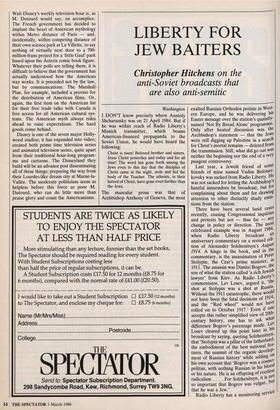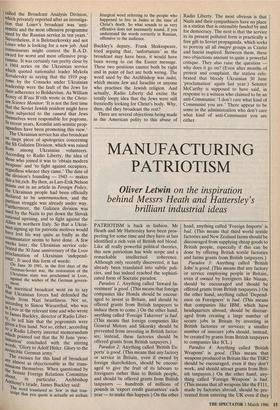LIBERTY FOR JEW BAITERS
Christopher Hitchens on the
anti-Soviet broadcasts that are also anti-semitic
Washington I DON'T know precisely where Anatoly Shcharansky was on 21 April 1984. But if he was within reach of Radio Liberty's Munich transmitter, which beams American-financed propaganda to the Soviet Union, he would have heard the following:
Christ is risen! Beloved brother and sisters. Jesus Christ yesterday and today and for all time! The word has gone forth among the Jews even to this day that the disciples of Christ came in the night, stole and hid the body of the Teacher. The atheists, in their hatred of Christ, have gone even further than the Jews.
The muscular prose was that of Archbishop Anthony of Geneva, the most exalted Russian Orthodox prelate in West- ern Europe, and he was delivering his Easter message over the station's quaintly- named 'Not By Bread Alone' programme. Only after heated discussion was the Archbishop's statement — that the Jews were still digging up Palestine in a search for Christ's mortal remains — deleted from the transmission. Still, what did go out was neither the beginning nor the end of a very pungent controversy.
Last year, a Jewish friend of some friends of mine named Vadim Belotser- kovsky was sacked from Radio Liberty. He was not sacked for letting the Archbishop's hateful innuendoes be broadcast, but for complaining about them and for drawing attention to other distinctly shady emis- sions from the station.
There have been several lurid cases recently, causing Congressional inquiries and protests but not — thus far — any change in policy or direction. The most celebrated example was in August 1984, when Radio Liberty broadcast an anniversary commentary on a revised edi- tion of Alexander Solzhenitsyn's August 1914. A hinge in the book, and in the commentary, is the assassination of Peter Stolypin, the Czar's prime minister, in 1911. The assassin was Dimitri Bogrov, the son of what the station called `a rich Jewish lawyer' from Kiev. As Radio Liberty's commentator, Lev Losev, argued it, 'the shot at Stolypin was a shot at Russia. Without the 1911 catastrophe, there would not have been the fatal decisions of 1914, and the "Red wheel" would not have rolled on to October 1917.' Even if one accepts this rather simplified view of 20th- century history, one has to ask what difference Bogrov's parentage made. Lev Losev cleared up this point later in his broadcast by saying, quoting Solzhenitsyn, that `Stolypin was a pillar of the fatherland, the embodiment of the best national fea- tures, the summit of the organic develop- ment of Russian history' while adding on his own account that `Bogrov was a cosmo- politan, with nothing Russian in his blood or his nature. He is an offspring of rootless radicalism . . . . For Solzhenitsyn, it is but so important that Bogrov was vulgar, out that he was a Jew.' Radio Liberty has a monitoring service called the Broadcast Analysis Division, which privately reported after an investiga- tion that Losev's broadcast was 'anti- Semitic and the most offensive programme aired by the Russian service in ten years.' Nevertheless, it is Belotserkovsky and not Losev who is looking for a new job. And connoisseurs might contest the B.A.D. award for worst and most offensive prog- ramme. It was certainly run pretty close by a 1984 series on the Ukrainian service which quoted nationalist leader Mykola Kovalevsky as saying that the 1919 pog- roms by the Cossacks under Ukrainian leadership were the fault of the Jews for their adherence to Bolshevism. As William Korey of B'nai B'rith wrote in the Christ- ian Science Monitor: 'It is not the first time that the Soviet Jewish resident might have been subjected to the canard that Jews themselves were responsible for pogroms. In recent years, Kremlin anti-semitic prop- agandists have been promoting this view.' The Ukrainian service has also broadcast an inept piece of apologetics concerning the SS Galizien Division, which was raised from among Ukrainian volunteers. According to Radio Liberty, the idea of those who joined it was to 'obtain modern weapons' and 'to fight against occupiers, regardless whence they came.' The date of the division's founding — 1943 — makes this a bit xich. By then, as Lars-Erik Nelson Points out in an article in Foreign Policy, the Ukrainian people had been officially declared to be untermenschen, and the Partisan struggle was already under way. Furthermore, the Galizien division was used by the Nazis to put down the Slovak national uprising, and to fight against the Allies in northern Italy. So that a Ukrai- nian signing up for patriotic motives would have lost his way quite as badly as the commentator seems to have done. A few weeks later, the Ukrainian service cele- brated the 30 June anniversary of the Lvov Proclamation of Ukrainian 'independ- ence'. It used this form of words:
On June 30 1941, in the first days of the German-Soviet war, the restoration of the Ukrainian state was proclaimed in Lvov, against the wishes of the German govern- ment.
The uncritical broadcast went on to say that Ukrainian forces had defended the locals from Nazi beastliness. Not so, according to Simon Wiesenthal, who was in Lvov at the relevant time and who wrote t° Buckley, director of Radio Liber- tY, to tell him that the pogromists were Even a free hand. Not so, either, according ° a. Radio Liberty internal memorandum Wilneh pointed out that the 30 June `proc- Lamation' concluded with the stirring words, 'Glory to Adolf Hitler. Glory to the Invincible German army.' The excuses for this kind of broadcast are almost as objectionable as the trans- missions themselves. When questioned by the Senate Foreign Relations Committee about, in particular, Archbishop Anthony's tirade, James Buckley said: The word translated as `Jew' in that tran-
script that you quote is actually an archaic liturgical word referring to the people who happened to live in Judea at the time of Christ's death. So what sounds to us very offensive does not necessarily sound, if you understand the words correctly in Russian, offensive to the audience.
Buckley's deputy, Frank Shakespeare, tried arguing that, 'unfortunate' as the broadcast may have been, it would have been wrong to cut the Easter message. These two positions cannot both be right and in point of fact are both wrong. The word used by the Archbishop was iudei, which means Jew and Israelite or anyone who practises the Jewish religion. And actually, Radio Liberty did excise the totally loopy idea that the Jews were still frenziedly looking for Christ's body. Why, then, did they broadcast the rest?
There are several objections being made in the American polity to this abuse of Radio Liberty. The most obvious is that Nazis and their sympathisers have no place in a station that is ostensibly funded by and for democracy. The next is that the service in its present polluted form is practically a free gift to Soviet propaganda, which seeks to portray all all émigré groups as Czarist and fascist inspired. Between them, these two objections amount to quite a powerful critique. They also raise the question why does it go on? (Even after months of protest and complaint, the station cele- brated that bloody Ukrainian 30 June `proclamation' again last year.) Senator McCarthy is supposed to have said, in response to a witness who claimed to be an anti-Communist: `I don't care what kind of Communist you are.' There appear to be some in the administration who don't care what kind of anti-Communist you are either.















































 Previous page
Previous page